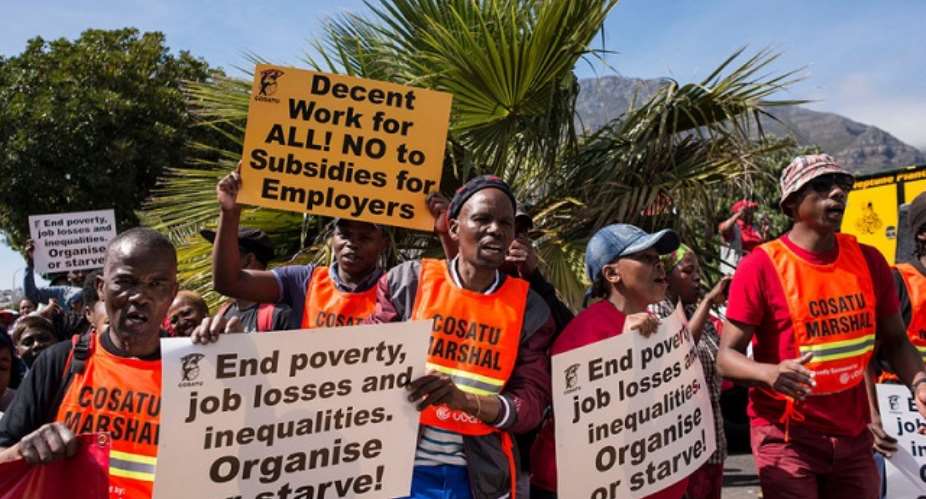In a society, everyone should have enough money to live decently. Even if there is no money, there should be enough food in the house to keep you going until the right solution comes insight but living with dignity, today in many African countries is totally impossible.
The term inequality identifies the differences in the levels of well-being deriving mainly from the disparities in the level of income, consumption, access to health care, education and life expectancy.
In the public debate, there is a tendency to take for granted that inequality is only an economic problem. This vision, however, risks putting the complexity of the phenomenon in the background. In fact, there are various forms of inequality: social, economic, political, digital, etc.
The socio-economic development of sub-Saharan African countries has been on the agenda of the world community and international organizations since the early 1960s, the beginning of the period of the liberation of many countries of the continent from colonial dependence.
After half a century, we have to admit the fact that, despite progress in many countries, the main social and economic problems are far from being resolved in Sub-Saharan Africa. The key problems remain the high level of poverty and social inequality.
According to experts, another problem in the countries of Tropical Africa is the low level of general literacy and education. In 2016, the literacy rate in the region as a whole was less than 60%. A more difficult situation has developed in higher education, analysts say.
In all countries of the region, the data for which is provided by the World Bank is that the proportion of the population with basic higher education does not exceed 10%.
The cause is not only due to the lack of development in society, but also an obstacle to industrialization and, consequently, further economic growth.
Analysts believe that the main reasons for the low level of education and literacy in the countries of Africa are its low accessibility for wide sections of the population, due to the high level of poverty and the lack of a well-coordinated state system in primary education.
In the coming decades, the countries of sub-Saharan Africa face the challenges of industrialization, providing energy and creating favorable conditions for life.
Solving the problems of this region largely depends on the sustainability of political and quality of economic institutions, external assistance, and strategic planning.
Assistance to countries in Tropical Africa is also part of the objective of the United Nations Sustainable Development Goals and is a prerequisite for preventing potential large-scale migration from Africa to Europe in the future.





 Supreme Court clears way for dual citizens to hold key public positions
Supreme Court clears way for dual citizens to hold key public positions
 Be transparent, don’t suppress the truth – Prof. Opoku-Agyemang to Jean Mensa
Be transparent, don’t suppress the truth – Prof. Opoku-Agyemang to Jean Mensa
 ‘I won’t tell the world I was only a driver’s mate during challenges’ – Prof Jan...
‘I won’t tell the world I was only a driver’s mate during challenges’ – Prof Jan...
 We’ll prosecute corrupt officials of Akufo-Addo’s govt – Prof Jane Naana
We’ll prosecute corrupt officials of Akufo-Addo’s govt – Prof Jane Naana
 [Full text] Acceptance speech by Prof Jane Naana Opoku-Agyemang as 2024 NDC Runn...
[Full text] Acceptance speech by Prof Jane Naana Opoku-Agyemang as 2024 NDC Runn...
 Election 2024: Don’t be complacent, we haven’t won yet – Asiedu Nketia cautions ...
Election 2024: Don’t be complacent, we haven’t won yet – Asiedu Nketia cautions ...
 Election 2024: Stop fighting over positions in Mahama’s next govt – Asiedu Nketi...
Election 2024: Stop fighting over positions in Mahama’s next govt – Asiedu Nketi...
 Prof Jane Naana Opoku-Agyemang will restore dignity of vice presidency – Fifi Kw...
Prof Jane Naana Opoku-Agyemang will restore dignity of vice presidency – Fifi Kw...
 'Ghana beyond aid' has turned out to be 'Ghana without compass' – Naana Opoku-Ag...
'Ghana beyond aid' has turned out to be 'Ghana without compass' – Naana Opoku-Ag...
 Nation builder Mahama will deliver on his promise of a 24-hour economy for the b...
Nation builder Mahama will deliver on his promise of a 24-hour economy for the b...
